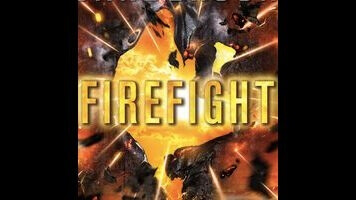Brandon Sanderson’s Firefight trades exterior threats for internal struggles

Perhaps no other superhero is involved in as many “what if?” scenarios as Superman. Comic writers have posited how the world of DC Comics might be different if the Man Of Steel wasn’t there to unite the Justice League, what might happen if he disappeared or died, and the terror he could sow if he wasn’t fighting for “truth, justice, and the American way.” Some people think Superman’s awesome power and Boy Scout ethics make him boring, but these stories show his importance as a beacon of hope—proof that absolute power doesn’t have to corrupt absolutely.
While Superman is never directly mentioned in Brandon Sanderson’s Reckoners series, the character’s influence looms large. The title villain of the first novel, Steelheart, was a near invulnerable, flying tyrant that commanded a group of lesser superpowered beings. The dystopian future, in which the rise of the supervillains dubbed Epics leaves normal humans cowering in the shadows, has given rise to a cult that believes superheroes will eventually arise to save the world that takes as its holy symbol a stylized “S.”
Firefight, which takes place just a few months after Steelheart, digs into the question of whether those heroes might have already emerged. At the end of Steelheart, the series’ teenage protagonist, David, is forced to question his fanatical hatred of Epics by the revelation that both his love interest, Megan, and mentor, Prof, have powers but avoid using them because of their terrible psychological effects. While Steelheart gave David the task of persuading Prof and his resistance group to take on a seemingly implacable external force, this one focuses on facing internal struggles. There are certainly fearsome new external threats that play out through gripping, fast-based action sequences, but the conversations David has with his companions as he tries to understand their inner struggles are some of the novel’s most compelling moments.
David remains an extremely likable character, avoiding the pitfalls of other YA heroes by seemingly refusing to despair. When situations get ugly, as they often do when a team of humans has to face a scripture-quoting psychopath who destroys whole cities and a near-omniscient mastermind who has flooded all of Manhattan, David manages to keep the narrative upbeat with his ridiculous similes, such as, “You’re like a potato in a minefield.”








































